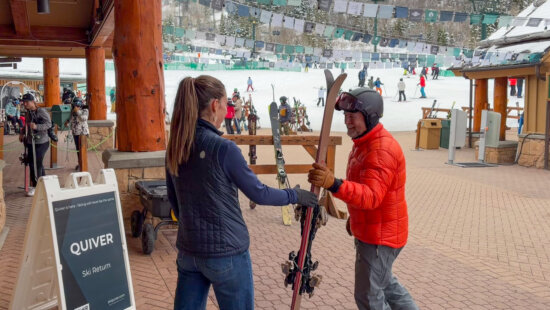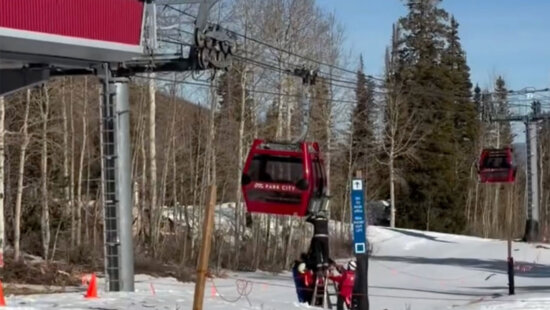Neighbors Magazines
A Park City skier’s path from potential career-ending injuries to global competitions
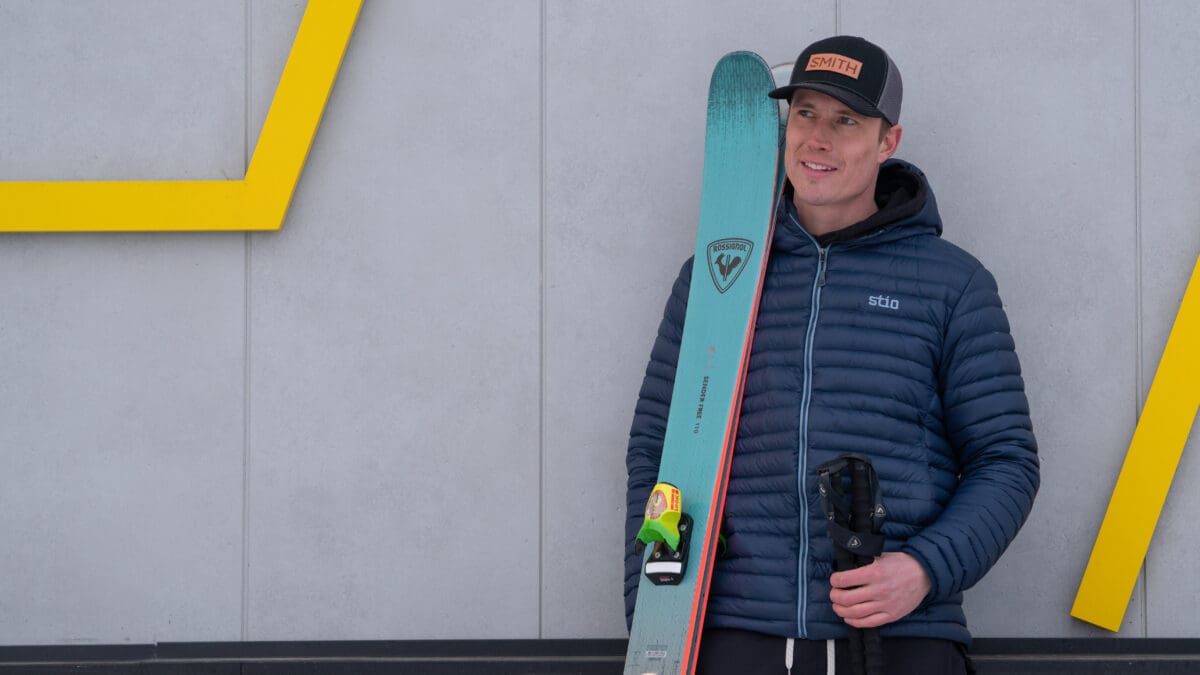
Alex Schlopy. Photo: Park City Photographers // Deb DeKoff
Alex Schlopy's return to the slopes on his own terms
By Jacquie Syms, Neighbors of Park City
This story contains a reference to suicide. If you are experiencing suicidal thoughts, please visit 988lifeline.org for prevention resources.
Alex Schlopy grew up on skis; after all, the woman he calls “Mom” is a two-time Olympic downhill ski racer. “My mom actually raced while she was pregnant with me, so I’ve been going fast since before I was born,” Alex chuckled. From 18 months, the slopes were his playground, and with podiums in his pedigree, those dreams were realized at a relatively fast pace. But the journey to achievement was fraught with risks and recovery. Navigating adolescence and early adulthood as an extreme winter athlete would challenge him from rocky peaks to rock bottom.
Although Alex was shredding in diapers, he didn’t truly fall in love with skiing until he was introduced to freestyle by his gymnastics coach. The sport was newly formed, and fellow local Olympic Gold Medalist and childhood friend Joss Christensen really got him hooked. Alex then won his first competition, The Vermont Open, at the age of 13. By the age of 15, two brutal injuries struck: a bad car accident that resulted in a severe concussion (one that would likely be diagnosed as a traumatic brain injury today) and, months later, a blown-out knee in a half-pipe crash (along with an additional blow to the head). These major setbacks and long-term symptoms led doctors to recommend ending his competitive career. Still, Alex attributes his own drive and the advocacy of his mom to seeking alternative healing methods, which allowed him to continue pursuing his dream. He pushed through vertigo, severe migraines, panic attacks, and depression. Visualization techniques would keep him moving toward his goals and became a crucial tool throughout his continued career.
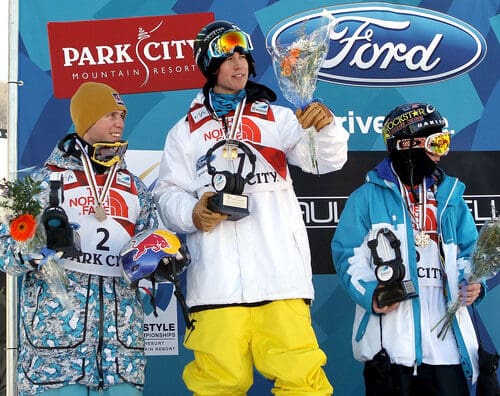
At 17, Alex hit his breakthrough, racking up major wins: the DuMont Cup, the People’s Choice Award (as the rookie member of the United States team at the Jun Olsson Super Sessions in Sweden with Tom Wallisch and Simon Dumont), and a gold medal at his first ever X Games appearance in Big Air. Alex then returned home to Park City to win at the World Championships and take first place at the Dew Tour less than a month later, all the while leaning on his visualization techniques and distinctive training adaptations to reach the podium again and again.
One of those adaptations, shorter physical sessions on the mountain, meant being the last guy up and first to leave, opposite the maxim of ‘dedicated champions.’ “From my head injuries, I had bouts of vertigo, and on a ski slope, that is not ideal, it’s very uncomfortable. So my training had to happen in much shorter time frames.” But after leaving, he’d train in his mind for hours more. “The journey doesn’t look the same for anybody,” says Alex. “Finding the way to make it best for you is what matters most.”
Alex’s meteoric rise was world-class. Traveling, competing, attending photoshoots, and signing sponsor contracts became commonplace, as did partying and drinking – often inherent in globetrotting ski culture. Fortunately, with the Olympics in sight, Alex refocused, leading him into the best shape of his life for qualifying. After a bout of harsh weather, adjustments, and a few great runs, it came down to less than half of a point between making the U.S. Olympic team and staying behind. His best friend and catalyst into freestyle skiing, Joss Christensen, ended up beating him, going on to win gold with a U.S. team that swept the podium. “I was so happy for him. It was the best possible outcome to not going myself.”
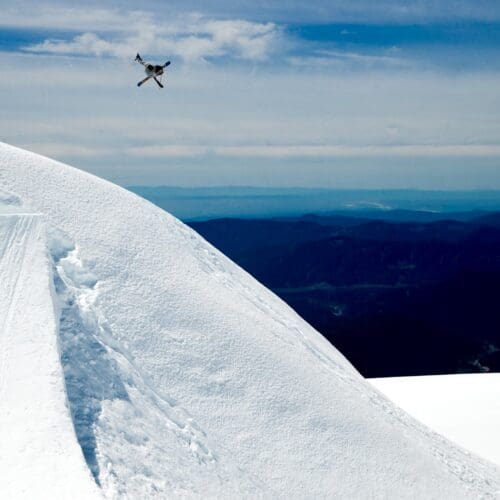
But inside, the disappointment was intense, and, for Alex, it became increasingly difficult to survive in the valley between glory and obscurity. Battling depression, Alex found ways to numb the pain. “It’s a lot more common than people realize,” Alex remembers, “You’re living a really high-high; at some point, it’s going to come down. When that all goes away, what do you do?” Skiing was not just something Alex did. It was a part of him. A part of his identity. Lost and hitting an extreme low, the partying, addiction, and depression turned self-destructive. “I felt like I had lost my purpose, identity, and I didn’t know who I was or what was left to live for.” During that time, Alex attempted to take his own life. But part of him knew that while he couldn’t see a way out, something had to open up. “I just needed to get up, get sober, and start walking toward that path.”
Alex’s journey to recovery included falling back in love with skiing just to ski, without the competition, intense drive to podium, and effort for external validation. It was through his renewed joy for the sport that Alex accessed gratitude, the beauty of life, and the world around him. Fragments of life that had always been there, during the climb, the fall, the pushing, and the parties, but had not been in his view.
Alex spent his 25th birthday in rehab. When he got out, the dream of going to the Olympics never faded, but his will to compete for himself replaced the competitive monster that he once fueled. “Three seasons ago, I returned to the X Games course again. I’ll never forget that nostalgic moment. I was going back for myself without sponsors or a coach. The battle I fought to get there was tough, but I made peace with everything that had happened and could walk away with a new perspective.”
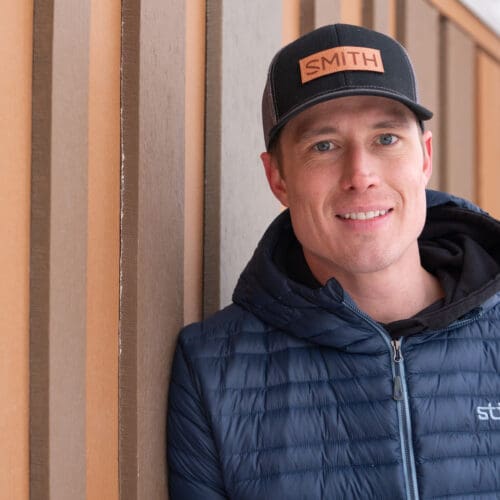
Back home in Park City, Alex tunes into his gratitude often, holding great appreciation for the opportunities to travel the world and see some of the most amazing places, but Park City will always be home. “There’s so much that’s happened here. In recovery, a lot of people tend to leave where everything happened. I didn’t want to do that. I just wanted to rewrite how I viewed my place and make a different path.”
Now, Alex helps other athletes meet goals along the way to what he hopes can be their highest potential at Jackson’s Hideaway. “I’m so grateful they’ve given me this opportunity to contribute to invigorating people’s love for skiing and to be able to share in their joy.”
He speaks out about his experiences with mental health, addiction, and recovery. “One of my therapists would say, ‘There’s sickness in secrets.’ She couldn’t have been more right. The more you hide things in your shadow, it’s like you’re not accepting that part of you. I have found that accepting it, and rewriting it, is where I have been able to change my life for the better.”
















